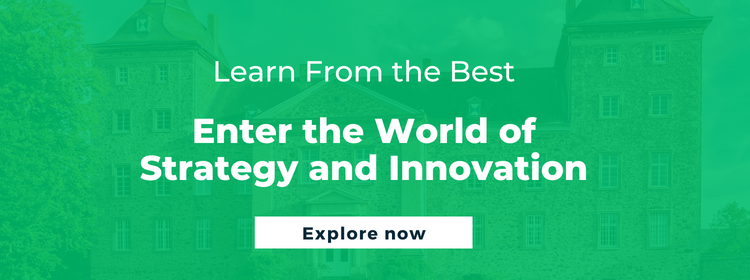What is Strategic Planning? A Simple Guide

A deep understanding of what is strategic planning has become a necessity today, with a rapidly changing business landscape characterized by unpredictable challenges. An effective strategic plan is a roadmap for the long-term success of any organization. In fact, a comprehensive strategic planning process can transform an overall business strategy into effective tactical strategies. Traditional planning methods may not be adequate for dealing with a disruptive market in which there is a high degree of uncertainty. Read this article to know how businesses can develop strategic plans, define their vision, and provide them with the necessary tools to survive in times of disruption.
What is Strategic Planning?
 A formal management process that provides an organization with a clearly defined direction for its future is called strategy planning. Furthermore, knowing an organization’s Strengths, Weaknesses, Opportunities, and Threats—or SWOT analysis—involves a comprehensive examination of both internal and external factors. Moreover, the analysis leads to the establishment of a compelling vision statement that outlines the business’s desired course of action. Strategic planning then translates this vision into actionable goals and objectives, outlining the specific milestones that must be achieved. It will also help allocate resources and identify the strategies needed to implement this plan and make it a success. In essence, the strategic planning process is a roadmap for the organization to achieve its long-term objectives.
A formal management process that provides an organization with a clearly defined direction for its future is called strategy planning. Furthermore, knowing an organization’s Strengths, Weaknesses, Opportunities, and Threats—or SWOT analysis—involves a comprehensive examination of both internal and external factors. Moreover, the analysis leads to the establishment of a compelling vision statement that outlines the business’s desired course of action. Strategic planning then translates this vision into actionable goals and objectives, outlining the specific milestones that must be achieved. It will also help allocate resources and identify the strategies needed to implement this plan and make it a success. In essence, the strategic planning process is a roadmap for the organization to achieve its long-term objectives.
ALSO READ: Strategies for Sustainable Business: The Ultimate 4-Step Guide
Why is Strategic Planning Important in a Disruptive Market?
1. Anticipates Change
Rapid innovation and a change in customer needs characterize the disruptors’ markets. To stay ahead of the curve, strategic planning, through environmental scanning and scenario planning, helps to identify potential disruptions and develop contingency plans.
2. Informs Agility
In a dynamic environment, traditional and rigid plans have often been challenged. Additionally, the culture of adaptability fostered by the creation of a coherent vision and flexible goals is built on understanding what is strategy planning and how it should be carried out. Furthermore, this will allow us to correct our mistakes and seize new opportunities as they arise.
3. Prioritizes Resources
A change in resource allocation is frequently necessary because of disruption. Strategic planning helps to identify core competencies and use tactical strategies to invest in areas that are best placed to exploit emerging trends, ensuring focus and maximizing competitive advantage.
4. Boosts Alignment
Disruption can create uncertainties. As a result, strategic planning fosters communication and collaboration across the organization.
5. Enhances Decision-Making
Decisions need to be made quickly and accurately in a disruptive market. A framework for assessing possible risks and rewards associated with new ventures or market shifts is provided to leaders through strategic planning. Consequently, this makes it possible to make data-driven decisions that are aligned with the organization’s longer-term objectives.
6. Promotes Innovation
Disruptions thrive on creative solutions. If strategy planning is based on scenario setting and takes account of divergent views, innovation can be brought about by promoting the exploration of alternative strategies and creating a culture for experimentation.
ALSO READ: Is Mapping Consumer Insights the Secret to Surviving in a Competitive Market?
How Can Businesses Effectively Plan for and Respond to Market Disruptions?
Market disruptions can be overwhelming, but understanding what is strategic planning can make all the difference. Here is how businesses can effectively prepare, create a business strategy and respond:
1. Continuous Scanning
 Develop a monitoring system to monitor industry trends, competitor activities, and emerging technologies. Furthermore, this will allow businesses to identify possible disruptions and inform strategic adjustments before they happen.
Develop a monitoring system to monitor industry trends, competitor activities, and emerging technologies. Furthermore, this will allow businesses to identify possible disruptions and inform strategic adjustments before they happen.
2. Scenario Planning
Don’t just plan for one future. Consider the various disruption scenarios, such as technological advances and legal changes, and adapt strategies accordingly.
3. Build Agility
Develop a culture that is willing to make changes. Moreover, invest in technologies that facilitate rapid adaptation, empowering employees and streamlining the decision-making process.
4. Embrace Innovation
Disruption offers new opportunities. Therefore, foster a culture of experimentation and devote resources to exploring innovative solutions that take advantage of the new trends.
5. Continuous Improvement
The strategic planning process is a continuous activity. This requires companies to regularly review their plans, assess their effectiveness in the face of disruption, and be ready to make necessary adjustments.
ALSO READ: 10 Wrong Pricing Strategies That are Costing Your Brand Money
What are the Key Components of a Strategic Plan for a Disruptive Market?
To begin with, it is important to highlight what is strategic planning in a highly disruptive market. Here are its key components:
1. Deep Market Understanding
Thoroughly assess the current market environment, including potential disruptors, customer needs, and competitor strategies. Additionally, check for emerging trends and evaluate their possible impact on the business.
2. Compelling Vision With Flexible Goals
Cultivate a clear vision statement in the face of disruption to outline what is needed for the next phase. Know how to translate this vision to concrete and measurable targets, but adaptable to changing circumstances.
3. Scenario Planning and Risk Assessment
Create multiple contingency plans by exploring different disruption scenarios. Moreover, assess the potential risks associated with each scenario and develop mitigation strategies.
4. Resource Allocation for Agility
To best exploit emerging trends, analyze core competencies and strategically allocate resources to the areas where they can be most exploited. However, investments in technologies and processes that enhance adaptability should be prioritized.
5. Culture of Innovation and Experimentation
A culture that embraces change is essential for what is strategic planning in an unpredictable market. It encourages the exploration of new ideas. Allocate resources for experimentation and pilot programs to test potential solutions and identify new opportunities within the disrupted landscape.
By incorporating these key components, a strategic plan becomes a dynamic tool for thriving in a disruptive market.
ALSO READ: How Brands Can Provide the Best Customer Experiences in the Phygital World
Frequently Asked Questions About Strategic Planning
1. How Can SWOT Analysis be Used to Inform Strategic Planning in a Volatile Market?
One of the main aspects of what is strategic planning is SWOT analysis. This is becoming even more important in an unpredictable market. First and foremost, identify the strengths and weaknesses within the organization. Furthermore, analyzing external opportunities and threats allows you to take proactive steps toward adapting to changing market dynamics, taking advantage of new possibilities arising from the disruption.
2. What are Some Common Pitfalls to Avoid When Creating a Strategic Plan for Disruptive Markets?
Avoid the trap of static planning when developing a strategic plan to disrupt. Adaptability is required by disruption markets. To cope with unforeseen changes, do not rely on strict projections; build flexibility and contingency plans. In addition, be careful not to underestimate the pace of change. Disruptions are often rapid. Ensure that mechanisms for continuous monitoring and rapid adaptation are part of your plan.
ALSO READ: How Supply Chain Analytics Can Boost Business Revenue
Navigating disruption requires a robust strategic plan. By incorporating continuous scanning, scenario planning, and a culture of innovation, you can transform disruption from a threat to an opportunity. Therefore, it is important to understand what is strategic planning, build expertise, and develop the skills to thrive in a dynamic market. To grow in this field, explore Emeritus’ strategy and innovation courses and equip yourself to lead your organization through disruption and emerge stronger than ever.
Write to us at content@emeritus.org






